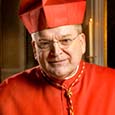Discipline and Doctrine: Law in the Service of Truth and Love (Part II)
- CARDINAL RAYMOND BURKE
Over the past few years, certain words, for example, "pastoral," "mercy," "listening," "discernment," "accompaniment," and "integration" have been applied to the Church in a kind of magical way, that is, without clear definition but as the slogans of an ideology replacing what is irreplaceable for us: the constant doctrine and discipline of the Church.
Populist Rhetoric Regarding the Church
Over the past few years, certain words, for example, "pastoral," "mercy," "listening," "discernment," "accompaniment," and "integration" have been applied to the Church in a kind of magical way, that is, without clear definition but as the slogans of an ideology replacing what is irreplaceable for us: the constant doctrine and discipline of the Church.
Some of the words, like "pastoral," "mercy," "listening," and "discernment" have a place in the doctrinal and disciplinary tradition of the Church, but they are now being used with a new meaning and without reference to the Tradition. For instance, pastoral care is now regularly contrasted with concern for the doctrine, which must be its foundation. The concern for doctrine and discipline is characterized as pharisaical, as wishing to respond coldly or even violently to the faithful who find themselves in an irregular situation morally and canonically. In this errant view, mercy is opposed to justice, listening is opposed to teaching, and discernment is opposed to judgment.
Other words are secular in origin, for example, "accompaniment" and "integration," and are used without grounding them in the truth of the faith or in the objective reality of our life in the Church. For instance, integration is divorced from communion which is the only foundation of participation in the life of Christ in the Church.
These terms are frequently used in a worldly or political sense, guided by a view of nature and reality which is constantly changing. The perspective of eternal life is eclipsed in favor of a kind of popular view of the Church in which all should feel "at home," even if their daily living is an open contradiction to the truth and love of Christ. In any case, the use of any of these terms must be firmly grounded in the truth, together with its traditional expression of our incorporation into Christ's Mystical Body by one faith, one sacramental life, and one discipline or governance.
The matter is complicated because the rhetoric is often attached to language used by Pope Francis in a colloquial manner, whether during interviews given on airplanes or to news outlets, or in spontaneous remarks to various groups. Such being the case, when one places the terms in question within the proper context of the teaching and practice of the Church, he may be accused of speaking against the Holy Father. As a result, one is tempted to remain silent or to try to explain doctrinally a language which confuses or even contradicts doctrine.
The way in which I have come to understand the duty to correct a populist rhetoric about the Church is to distinguish, as the Church has always done, the words of the man who is Pope from the words of the Pope as Vicar of Christ. In the Middle Ages, the Church spoke of the two bodies of the Pope: the body of the man and the body of the Vicar of Christ. In fact, the traditional Papal vesture, especially the red mozzetta with the stole depicting the Apostles Saints Peter and Paul, visibly represents the true body of the Vicar of Christ when he is setting forth the teaching of the Church.
Pope Francis has chosen to speak often in his first body, the body of the man who is Pope. In fact, even in documents which, in the past, have represented more solemn teaching, he states clearly that he is not offering magisterial teaching but his own thinking. But those who are accustomed to a different manner of Papal speaking want to make his every statement somehow part of the Magisterium. To do so is contrary to reason and to what the Church has always understood.
Making the distinction between the two types of discourse of the Roman Pontiff is, in no way, disrespectful of the Petrine office. Much less, does it constitute enmity of Pope Francis. In fact, on the contrary, it shows ultimate respect for the Petrine office and for the man to whom Our Lord has entrusted it. Without the distinction, one would easily lose respect for the Papacy or be led to think that, if he does not agree with the personal opinions of the man who is the Roman Pontiff, then he must break communion with the Church.
In any case, the more that such rhetoric is used without a corrective, that is, without relating the language to the constant teaching and practice of the Church, the more confusion enters into the life of the Church. Canonists have a particular responsibility to make clear what the doctrine and corresponding discipline of the Church is. For that reason, in particular, I judged it important to clarify the purpose of Canon Law.
 This is Fraser Field, Founder of CERC. I hope you appreciated this piece. We curate these articles especially for believers like you.
This is Fraser Field, Founder of CERC. I hope you appreciated this piece. We curate these articles especially for believers like you.
Please show your appreciation by making a $3 donation. CERC is entirely reader supported.

Acknowledgement
 Cardinal Raymond Burke. "Discipline and Doctrine: Law in the Service of Truth and Love (Part II)." cardinalburke.com (May 9, 2023).
Cardinal Raymond Burke. "Discipline and Doctrine: Law in the Service of Truth and Love (Part II)." cardinalburke.com (May 9, 2023).
Reprinted with permission from the author.
The Author
Raymond Leo Cardinal Burke is an American Cardinal Prelate of the Roman Catholic Church.
Copyright © 2023 Cardinal Raymond Burke


